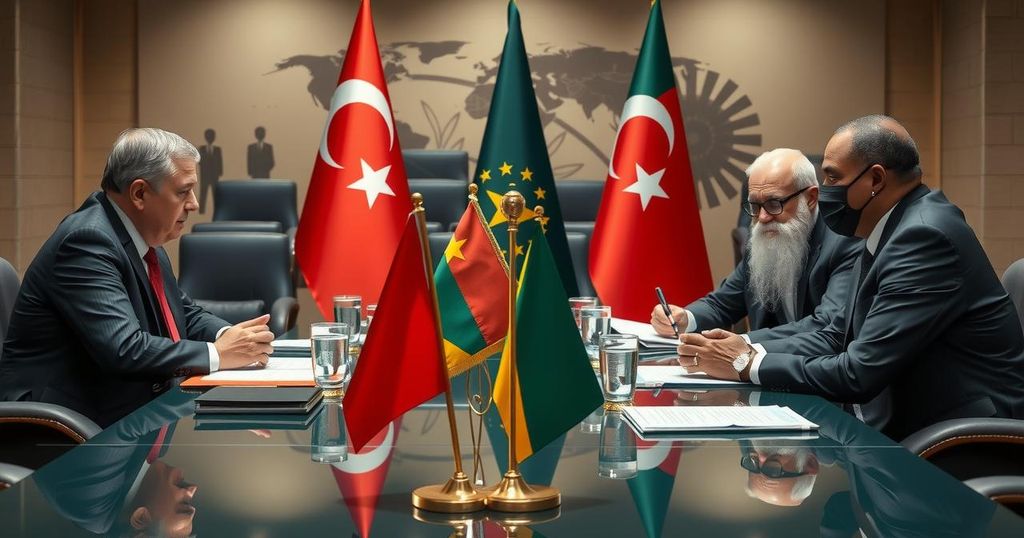Global news
AB, AFRICA, ANKARA, ARABIAN SEA, ASIA, BAYRAKTAR, BILATERAL RELATIONS, CHINA, DEFENSE COOPERATION, DIPLOMACY, EMRE PEKER, ERITREA, ETHIOPIA, EURASIA GROUP, EUROPE/ASIA, FIGHTER JETS, HASSAN SHEIKH, HASSAN SHEIKH MOHAMUD, HORN OF AFRICA, INTERNATIONAL RELATIONS, MEXICO, NORTH AMERICA, PEKER, REC, SOMALIA, SOMALILAND, TURKEY
Jamal Walker
0 Comments
Turkey Mediates Agreement to Alleviate Ethiopia-Somalia Tensions
Ethiopia and Somalia have agreed to resolve a conflict over access to the Arabian Sea, with Turkish President Erdoğan mediating the discussions. Ethiopia’s port leasing deal with Somaliland had threatened to escalate tensions, but this agreement seeks to stabilize relations. Turkey’s longstanding ties and military presence in Somalia, coupled with significant investments in Ethiopia, position it as a key player moving forward.
Ethiopian President Abiy Ahmed and Somali President Hassan Sheikh Mohamud have reached a significant agreement aimed at resolving a protracted dispute regarding Ethiopia’s access to the Arabian Sea. This agreement was announced in Ankara following extensive negotiations facilitated by Turkish President Recep Tayyip Erdoğan, who is solidifying Turkey’s role as a vital player in East African geopolitics.
The underlying conflict stems from Ethiopia’s landlocked status following Eritrea’s secession in 1993, which has hindered its economic development. A notable flashpoint occurred in January when Ethiopia entered into a deal to lease a port from Somaliland, a breakaway region in Somalia, which prompted threats from Somalia to expel Ethiopian troops who are currently assisting in the fight against al-Shabab. Concerns arose that the tension could escalate towards a conflict reminiscent of the Ogaden War of 1977-78.
Turkey’s involvement is rooted in its deep-seated relations with both Ethiopia and Somalia, along with its interest in maintaining regional stability. Notably, Turkey operates its largest overseas military base in Somalia, and it has previously supported the Ethiopian government during the Tigray conflict by supplying advanced military drones. According to Eurasia Group expert Emre Peker, “The agreement will help make Turkey into an even more relevant power in the region, with Ankara pitching itself as a security partner for African countries.” Furthermore, Turkish investments in Ethiopia, valued at over $2 billion, mark them as one of the most significant investors in the region after China.
Following this pivotal agreement, representatives from both countries plan to reconvene in February to engage in technical discussions aimed at refining the specifics regarding port access. This move not only signifies a potential alliance but also hints at future commercial advantages for Turkish enterprises through enhanced trade facilitated by Ethiopian access to Somali ports.
The conflict involving Ethiopia and Somalia revolves around Ethiopia’s desperation for maritime access following its landlocked status since Eritrea’s independence. The arrangement to lease a port from Somaliland raised tensions, leading to threats from Somalia regarding the expulsion of Ethiopian troops. The interests of Turkey, with its military presence and significant investments in the region, reflect a deeper geopolitical strategy aimed at enhancing Turkey’s influence while promoting stability.
In conclusion, the agreement between Ethiopia and Somalia signifies a crucial step towards resolving longstanding tensions regarding maritime access. This diplomatic achievement, mediated by Turkey, underscores Ankara’s growing influence in the Horn of Africa. As both nations move towards further negotiations, the potential for regional trade and cooperation may be amplified, benefiting Turkish investments and enhancing security within the region.
Original Source: www.gzeromedia.com




Post Comment